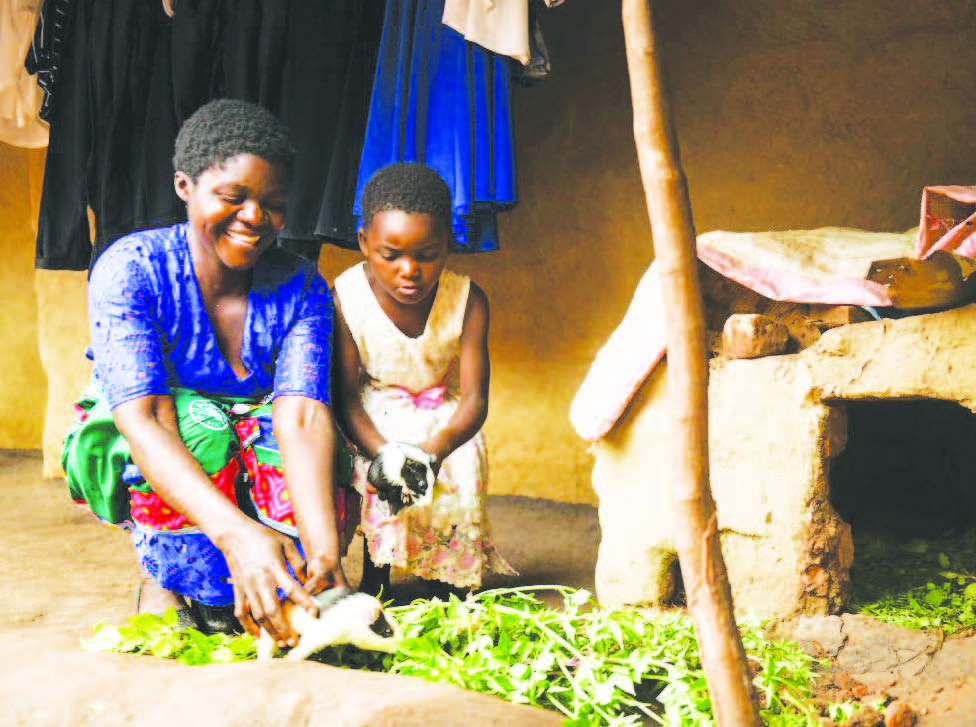‘Food is nothing without hygiene’
Water, sanitation and hygiene are key for good nutrition outcomes, our Staff Writer JAMES CHAVULA explains why:
In Chimiko Village, a tea-growing rural setting south-west of Thyolo Boma, Anne Lihoma’s children get any food they yearn for.

In the homestead, the signs of plenty flash past: maize ready for harvest, a vegetable garden in the backyard, different fruit trees, pigs, five chickens and guinea pigs.
When the farmer reaps various vegetables from the backyard, she washes hands with soap before chopping the leaves for the day’s meal.
Sanitation and hygiene help everyone in her family get the full benefits of the diversified diets containing locally available legumes, meat and fruits. It also reduces the risk of preventable infections, especially diarrhoea.
“Some children eat food from all six groups, but still suffer from malnutrition due to poor hygiene,” she explains.
The household of seven boasts a clean pit latrine with a hole cover; a foot-operated handwashing facility called mpondagiya; a spotless kitchen fitted with a less smoky cookstove that uses less fuelwood than open fireplaces marked by three stones; a rubbish pit and a wooden rack for kitchen utensils.
“Gone are the days a single latrine served 10 households. Now every household is required to own one because unsanitary homes are hotspots of diarrhoea which fuel malnutrition in children,” Lihoma says.
To her, “nutritious food is nothing without sanitation and hygiene”. She strives to keep her household and everything in it clean.
“If you give children all food groups, they will rarely get bedridden by preventable diseases. However, infections and parasites can wipe away the gains,” she states.
In 2015, her five-year-old daughter was diagnosed with tapeworms, which cause anaemia and malnutrition. This affects children’s physical and mental growth.
“I spent a lot of money buying medicine because the girl was weak and sickly despite eating three meals a day. I paid K1 000 to hire a bicycle that took her to Khonjeni Health Centre. Tapeworms were getting fatter while she was losing weight,” Lihima narrates.
The hospital trip drained money the family could have used to buy nutritious foods such as fish and beans, she explains.
Lihoma rarely buys vegetables because there are plenty in her grass-fenced garden. She shares some with her neighbours.
Her clean and food-secure homestead mirrors the benefit of Afikepo, a nutrition programme supported by the United Nations Children Fund (Unicef) and Food and Agriculture Organisation (FAO) with funding from the European Union.
“Sanitation and hygiene has reduced house flies that once contaminated foodstuffs and utensils as they flew from stools and other unclean places,” she states.
Group village head (GVH) Chimiko has ordered every house on the edge of the sprawling tea fields to own a clean toilet instead of depending on neighbours.
“No one is safe unless everyone has adequate sanitation and hygiene,” says the traditional leader.
Lihoma attributes the shift to community-based volunteers trained by Afikepo to promote nutrition, sanitation and hygiene. They target homes with pregnant women, breastfeeding mothers and children aged below five, but the whole community benefits.
“Since we embraced sanitation and hygiene, cholera has become history and children are not frequently bedridden by diarrhoea and other sanitation-related diseases transmitted through contaminated water and food,” she explains.
She washes her hands and dishes using clean water and soap.
Hygiene has also become a trusted weapon against the Covid-19 pandemic prevented by repeatedly washing hands with soap, social distancing and wearing a face mask. This illustrates how hand hygiene reduces deadly infections.
The Ministry of Health reports that 52 percent of outpatients in the country’s hospitals seek treatment for waterborne and sanitation-related illnesses.
To reduce the disease burden, Lihoma requires everyone in her household to wash hands during critical junctures such as before eating and feeding a baby, prior to cooking as well as after using the latrine and changing the baby.
“Improved sanitation and hygiene pay. For a year, my five-year-old daughter Ivy, who is in Standard One, has never fallen sick. She never misses classes to seek medical treatment,” she states.
When Ivy was hospitalised at Khonjeni, her mother was stuck by the sickbed instead of taking care of the household, doing income-generating activities or participating in community works.
Lihoma and her husband, who sells secondhand clothes in the rural trading centres, thank a promoter who constantly gives them nutrition, sanitation and hygiene tips.
“The promoter visits me twice a month to discuss how we can take care of our children and the rest of the household without compromising their health,” she says.
Nutritional promoter Patricia Moses, 36, visits 16 households a fortnight. The single mother of five has all sanitation facilities seen in the homesteads she serves.
She explains: “With K7 000 from piecework in neighbouring crop fields, I engaged young men to dig a pit and construct a latrine for me.
“I have to live by example. I should be number one by doing what I promote because action speaks louder than words.”
Moses has made handwashing a habit to beat Covid-19, which disrupted her work in January when Malawi was overwhelmed by the second wave. Patricia urges Malawians to keep washing hands with soap because it reduces numerous infections that fuel malnutrition and deaths among children.
“Covid-19 has shown the benefit of basic hygiene. I hope we will continue to wash hands with soap when the outbreak is over,” says the volunteer who works closely with the GVH.
Chimiko, born Esther Makina, backs Afikepo’s work because “healthy people are productive people”.
“Dirty hands and homes without latrines fuel disease outbreaks that make our nation poor,” she states.





